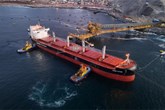Amer Shipping orders two dry cargo vessels from Concordia Damen
Inland shipping construction yard Concordia Damen is set to deliver two ‘CDS Dry Cargo 110’ vessels to Amer Shipping.
Sustainability considerations and the hull shape of this in-house developed ship type were the deciding factors motivating the order, partly because it allows skippers to sail longer at (very) low water levels, which is predicted to occur often in the coming years.
Amer Shipping already has a fleet of 57 vessels, including: owned tankers, dry cargo and container vessels, as well as associated ships. The company transports approximately 8 million tpy of cargo, mainly raw materials for construction projects and project cargo for various industries. Amer Shipping is mainly active in the Netherlands, Belgium, Germany, and Switzerland and is now expanding and adapting its fleet to put its sustainability commitment into practice.
Inland shipping entrepreneur Peter Buijks, co-owner of Amer Shipping, comments:
“We have been working on making our daily operations more sustainable for some time now. New ships must match this effort. These two bulk carriers are based on Concordia Damen’s Parsifal tankers and a lot of research has been done on them, such as speed versus fuel consumption, resistance, and future adaptability. For example, we’ll install Stage V engines and shaft generators. Our customers are increasingly looking at their CO2 emissions. In order to continue to serve them well, we are developing ourselves along with this trend and are looking at various options to reduce our footprint. These ships fit in well with this goal.”
Read the article online at: https://www.drybulkmagazine.com/dry-bulk/01022023/amer-shipping-orders-two-dry-cargo-vessels-from-concordia-damen/
You might also like
NYK Group operates methanol-fuelled bulk carrier for BHP
NYK Bulk & Projects Carriers Ltd has operated the methanol dual-fuel bulk carrier 'Green Future' using low-carbon methanol fuel, achieving an approximately 65% reduction in greenhouse gas compared to conventional fuel.

